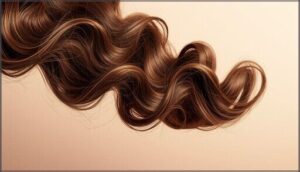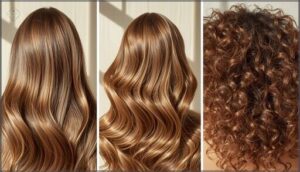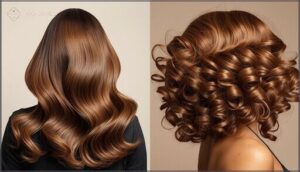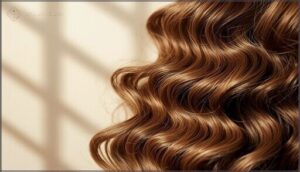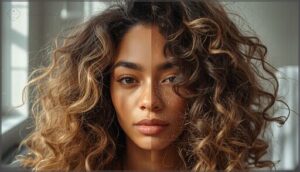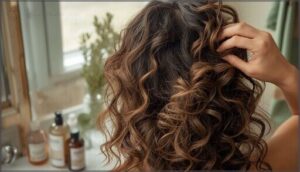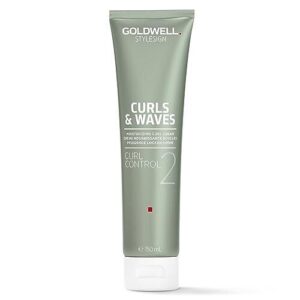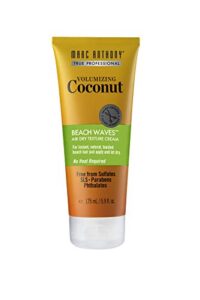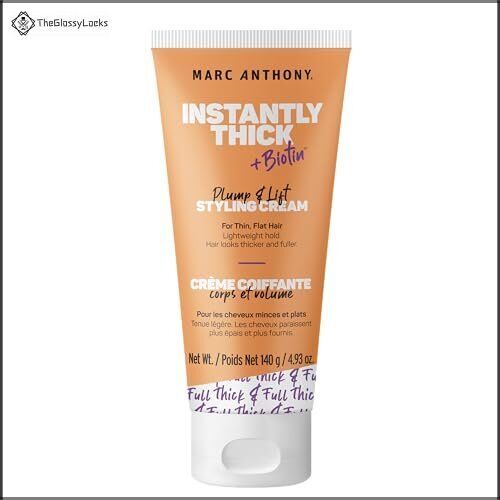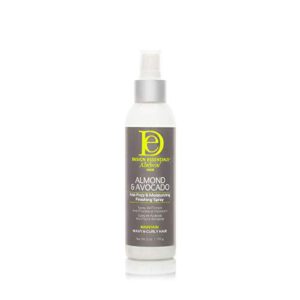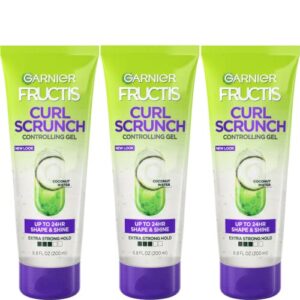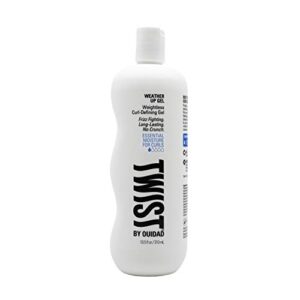This site is supported by our readers. We may earn a commission, at no cost to you, if you purchase through links.
You run your fingers through your hair after a shower, and there they are—those unmistakable S-shaped waves that refuse to sit flat but won’t quite curl into ringlets either. Your strands have body, volume, and a mind of their own, especially when humidity enters the picture. This is 2C hair, the most pronounced wave pattern in the wavy hair family, characterized by deep, well-defined waves that start forming right at your roots.
Unlike looser wave types that can pass for straight when stretched, 2C hair announces itself with texture you can’t ignore, bringing both enviable volume and the persistent challenge of frizz control.
Understanding what makes your hair type unique—from its medium-to-coarse texture to its moisture needs—becomes the foundation for working with your waves instead of fighting them.
Table Of Contents
- Key Takeaways
- What is 2C Hair Type?
- Key Characteristics of 2C Hair
- Identifying 2C Hair Vs. Other Types
- Common Challenges With 2C Hair
- Best Care Routine for 2C Hair
- Effective Styling Tips for 2C Hair
- Top Products for 2C Hair
- Frequently Asked Questions (FAQs)
- What does 1C hair look like?
- How do I tell if my hair is 2B or 2C?
- What does 2C hair look like?
- Am I 2C or 3A hair?
- What does 2A hair look like?
- How do I know if my hair is 2B or 2C?
- Is 2C hair curly or wavy?
- What haircut is best for 2C hair?
- Can 2C hair become more curly over time?
- What causes 2C hair to lose its waves?
- Conclusion
Key Takeaways
- 2C hair features deep S-shaped waves starting at the roots with medium-to-coarse texture and high density, sitting at the waviest edge of Type 2 before transitioning into curly patterns like 3A.
- The biggest challenges with 2C hair are frizz control and moisture retention due to lifted cuticles and uneven oil distribution, requiring sulfate-free products, weekly deep conditioning masks, and humidity-blocking techniques.
- Effective styling for 2C waves involves applying lightweight products to soaking-wet hair, scrunching upward to enhance the natural S-pattern, plopping in a microfiber towel, and diffusing on low heat while avoiding touch until completely dry.
- The best product strategy balances moisture without weight by layering leave-in conditioners with strong-hold gels on damp hair, using wide-tooth combs for detangling, and protecting waves overnight with satin pillowcases or loose braids.
What is 2C Hair Type?
You’ve probably heard about hair typing systems and wondered where your waves fit in. If your hair is more than wavy but stops short of forming full curls, you might’ve 2C hair, a texture with its own distinct personality and needs.
While 2C waves have their own character, understanding the full spectrum—from loose waves to tightly coiled textures like 4C hair—can help you identify your pattern more accurately.
Let’s break down what defines this hair type, starting with how the hair typing system actually works.
Overview of The Hair Typing System
Your hair’s natural shape isn’t random—it follows a roadmap. The Hair Typing System, created by stylist Andre Walker in the 1990s, classifies hair texture from straight (Type 1) to coily (Type 4), with wavy hair falling into Type 2.
Each category splits into A, B, and C subtypes based on curl pattern tightness, giving you a starting point for frizz management and styling product reviews.
If you want to learn more about the full hair typing system, it’s helpful to explore the different curl patterns and their unique care needs.
Defining Features of 2C Hair
Once you know where you land on the typing scale, spotting 2C hair becomes straightforward. This texture sits at the waviest edge of Type 2, where hair refuses to lie flat but stops short of full curl formation. Here’s what sets it apart:
- Strong, deep waves that form clear S shapes along the strand
- Noticeable lift starting right at the roots
- Medium to coarse individual strands that feel sturdy
- High density that creates natural volume
- Frizz-prone texture that reacts quickly to humidity
You’ll often see partial ringlets forming on the ends, especially when moisture balance is dialed in. The waves hold their shape longer than looser patterns, giving you lasting definition without constant restyling—though frizz control remains your biggest challenge in damp weather.
Proper care is essential, as maintaining scalp balance can prevent common issues like dryness or excess oiliness.
S-Shaped Wave Pattern Explained
That distinct S pattern comes from curved follicles directing each strand along a bent path. As your Type 2C hair grows, it naturally memorizes those repeated directional bends, forming wave geometry that stays visible even after brushing. Water weight temporarily stretches the pattern, but once dry, those S-shaped waves bounce back—stronger curl formation than 2A or 2B, yet stopping short of full ringlets.
Type 2C hair forms resilient S-shaped waves from curved follicles that memorize directional bends and bounce back even after stretching
| Feature | 2C Wavy Hair | Type 3A Curls |
|---|---|---|
| Pattern Shape | Stacked S-shaped wave pattern throughout | Full spiral ringlets from root to end |
| Wave Start | Begins at the root with visible bends | Corkscrew loops start near scalp |
| Definition | Deep waves without complete closure | Consistent 1-inch diameter loops |
| Frizz Control Needs | High—lifted cuticles catch humidity easily | Moderate—defined curls hold moisture better |
Key Characteristics of 2C Hair
Now that you know where 2C hair falls in the typing system, it’s time to get familiar with what actually makes this texture unique. Understanding these characteristics will help you recognize your own wave pattern and choose the right products for your hair.
Let’s break down the three defining features that set 2C apart from other wavy types.
Texture, Density, and Volume
You’ll notice your 2C hair strands feel thicker between your fingers than finer wavy hair, and that coarser hair texture lets you layer on richer creams without losing your natural wave pattern.
Because your waves form strong S-shaped curves from root to tip, you get built-in hair volume and density that makes your mane look fuller even without volume boosters or special styling tricks.
Prone to Frizz and Dryness
Unfortunately, your 2C waves wrestle with more frizz and dryness than straighter textures, because the cuticle layer lifts and opens gaps that let moisture escape quickly while humidity rushes in unevenly.
Mastering hair hydration and moisture balance becomes your ticket to frizz reduction and taming those dryness causes for good.
- Medium to high hair porosity forces you to fight constant moisture retention battles—water floods in, then leaks back out
- Uneven cuticle surfaces catch light on every rough edge, broadcasting frizz like a spotlight
- Sluggish scalp oil travel down your bends leaves roots greasy while ends crack from dryness
- Humidity swings swell your strands at different rates, wrecking frizz control and turning smooth waves into a puffed halo
Wave Pattern Starting at The Root
A root-to-tip S pattern gives 2C hair its signature lift, because your wave bends right out of the scalp within the first half inch instead of flattening like 2A or 2B strands.
To keep that root volume intact without weighing down your S-bend, skip silicone-heavy formulas and reach for products designed for looser curl patterns like 3A hair, which share similar hydration needs.
That root wave formation, powered by your hair follicle structure, stacks visible ridges near your crown and creates natural scalp volume—especially along the sides—while encouraging wave clumping and curl definition from root to end.
Identifying 2C Hair Vs. Other Types
Understanding your hair type isn’t about fitting into a perfect box, it’s about recognizing what makes your waves unique. The wavy spectrum can feel confusing, especially when your hair sits right on the edge between types.
Let’s break down how 2C hair stands apart from its neighbors, so you can finally identify what you’re working with.
Differences Between 2A, 2B, and 2C Hair
Understanding your hair type within the wavy family means spotting the details that set 2A, 2B, and 2C hair apart. Each wave texture brings different needs for frizz control and moisture balance, so knowing where your hair texture lands helps you fine-tune your curl definition approach.
| Feature | 2A | 2B | 2C |
|---|---|---|---|
| Wave Pattern | Loose S-shape, bends mid-length | Clear S pattern throughout shaft | Deep S waves bordering loose curls |
| Root behavior | Flat roots, waves start mid-length | Somewhat flat crown, waves closer to roots | Wave pattern starts right at the root |
| Strand thickness | Fine, light strands | Medium thickness, moderate density | Coarse strands, high density |
| Frizz level | Least frizz-prone | Moderate frizz in humidity | Most prone to frizz and dryness |
2A hair barely holds its bend and often looks nearly straight without product, while 2B shows more structured waves that stay visible. 2C waves refuse to smooth out easily, giving you thick, voluminous texture from scalp to ends that demands richer hydration and stronger hold to maintain curl pattern definition.
2C Vs. 3A Hair Comparison
The boundary between 2C hair and 3A hair often blurs because both pack volume and movement, yet their curl pattern reveals the real difference. Type 2C hair stretches into elongated S-shaped waves that rarely complete a full spiral, while 3A curls form tighter ringlets with a consistent corkscrew shape from root to end.
Hair texture also shifts—2C strands feel coarser and respond well to lightweight gels for frizz control, whereas 3A curls stay softer and crave richer moisture to maintain their bouncy wave formation. Styling differences become clear when you notice 2C waves flatten faster under heavy products, but 3A spirals hold definition longer with proper hydration.
| Feature | 2C Hair | 3A Hair |
|---|---|---|
| Curl Pattern | Stretched S waves, slight end curl | Loose spiral ringlets, consistent coils |
| Root Behavior | Flatter near scalp, builds mid-length | Lifts at roots, rounder silhouette |
| Texture Feel | Coarse, sturdy strands | Soft, silky touch |
| Frizz Control Needs | Lightweight gels, minimal oils | Rich creams, hydrating leave-ins |
| Styling Hold | Loses definition faster when weighed down | Maintains bounce with moisture |
Visual Signs of 2C Hair
When you run your fingers through freshly washed hair, 2C reveals itself through specific visual markers that set it apart. Look for root lift that starts right at the scalp, not halfway down—your crown won’t lie flat because those S-shaped waves begin their journey immediately, creating defined waves that clump into chunky sections rather than individual strands.
| Visual Marker | What You’ll See |
|---|---|
| Root Area | Visible bends and curves at scalp, natural lift without teasing |
| Wave Pattern | Clear S-shape definition running full length, occasional end ringlets |
| Overall Shape | Thick clumps forming textured sections, rounded silhouette with volume |
Your hair strand shape tells the story—2C forms consistent curves that stay visible even after light brushing, distinguishing wavy to curly hair through its structured curl pattern and natural hair clumping behavior.
Common Challenges With 2C Hair
2C hair comes with its own set of struggles that can feel like a daily battle, especially when the weather isn’t cooperating. From fighting frizz to dealing with dryness, your waves need extra attention to stay defined and healthy.
Here are the most common challenges you’ll face with 2C hair and what’s actually causing them.
Managing Frizz in Humidity
When sticky air hits, your 2C waves can turn into a frizz halo fast. Humidity forces water molecules into your hair shaft, lifting the cuticle and scattering your S-shaped pattern in random directions. Managing frizz in 2C hair demands smart product choices and techniques:
- Apply anti-frizz leave-in conditioners and strong-hold gels to soaking-wet hair, trapping moisture inside so humid air can’t puff up strands further.
- Use silicone-based serums or humidity fighters that coat each wave, blocking extra water and keeping your cuticle smooth.
- Skip touching hair while it dries—friction roughens the surface and invites halo frizz, even with the best frizz control products.
Checking your local dew point helps you plan which wave-preservation strategies and cuticle care steps you’ll need that day.
Preventing Dryness and Breakage
Beyond taming frizz, dryness and hair breakage are the real rebels threatening your 2C waves. Moisture balance starts with sulfate-free washes two to three times weekly, letting natural oils protect strands.
Weekly hair masks restore elasticity, while gentle combing on wet, conditioned hair cuts mechanical stress. Heat protection sprays shield cuticles before hot tools, and skipping daily shampoos preserves moisture retention—your waves stay springy, not brittle.
Detangling Wavy Strands
Once breakage is under control, tangles become your next hurdle. Detangling wavy strands demands patience: always work from ends to roots with a widetooth comb on damp, conditioned hair to avoid snapping S-shaped wave patterns. Sectioning reduces re-knotting, and adding extra slip—through curl styling milk or a defining gel—lets tools glide smoothly.
- Start at the ends and move upward in small sections
- Use a widetooth comb or flexi brush on wet, conditioned hair
- Add detangling spray or lightweight oil for stubborn knots
- Pat dry with a curly hair towel to preserve wave definition
Best Care Routine for 2C Hair
Building a care routine for 2C hair doesn’t require a complicated ten-step process, but it does ask you to rethink a few basics that straight-haired friends might take for granted.
The right approach balances moisture without weighing down your waves, and it protects that S-shaped pattern from frizz and breakage.
Here’s how to structure your routine around three core practices that keep 2C hair looking its best.
Ideal Washing Frequency
Most professionals suggest you shampoo your 2C waves every two to three days, balancing scalp care tips with wave definition. If your roots feel oily or product buildup weighs down your pattern, adjust frequency slightly—some people thrive washing three to four times per week.
Gentle cleansing with sulfate-free formulas aids your hair washing frequency without stripping moisture, keeping your curl care and maintenance on track for healthier, bouncier waves.
Maintaining Moisture Balance
Maintaining moisture in 2C hair comes down to understanding your porosity and matching products to what your strands actually need. If water beads on the surface, lighter milks and humectant use help, while faster-drying, high-porosity waves thrive with richer creams that lock in hydration.
Weekly hydrating masks support frizz control and hair health, keeping your moisture levels steady and your pattern bouncy.
Detangling and Drying Techniques
Detangling 2C hair works best in the shower while conditioner is still coating every strand, using a wide-tooth comb or your fingers to work through knots from ends to roots.
After styling, plop your waves in a microfiber towel for 10 to 20 minutes, then diffuse on low heat with pixie or hover techniques to lock in curl care and maintenance while keeping frizz control tight.
Effective Styling Tips for 2C Hair
Styling 2C hair doesn’t have to feel like a battle against your natural texture; it’s about working with those waves instead of against them. The right techniques can transform frizzy, undefined strands into bouncy, well-formed waves that actually hold their shape throughout the day.
Here are three styling strategies that’ll help you get the most out of your 2C hair, from enhancing your wave pattern to protecting those curls while you sleep.
Enhancing Natural Waves
Your natural wave pattern already has serious potential—you just need the right techniques to let it shine. Styling on damp hair is key for strong curl definition, according to stylists who specialize in type 2C hair patterns.
Try these methods:
- Apply lightweight curl cream to soaking-wet strands for even clumping
- Scrunch upward from ends to roots to encourage your S-shaped wave
- Plop in a cotton T-shirt for 15 to 20 minutes
- Diffuse on low heat while lifting sections toward your scalp
These styling techniques work with your natural curl pattern, giving you frizz control and serious curl enhancement.
Reducing Frizz While Styling
Locking in moisture early stops frizz before it starts, which is why applying your styling product to soaking-wet hair creates strong clumps that won’t separate.
Layer a leave-in, then seal with gel for all-day frizz control and curl enhancement—humidity won’t stand a chance.
Wait until your waves are bone-dry before scrunching out the cast, keeping frizz-prone strands smooth and defined.
Nighttime Protection Methods
Your waves deserve a gentle landing after all that daytime styling, so swap your cotton pillowcase for satin to prevent frizz and breakage while you sleep. Loose braids or a high pineapple ponytail keep clumps intact, and applying nighttime serums on mid-lengths seals in moisture retention.
Smart sleep positioning—back or side with hair lifted—protects your scalp health and wave definition.
Top Products for 2C Hair
Finding the right products can feel like unlocking a secret code, especially when your waves refuse to cooperate without the right support. The best formulas for 2C hair strike a balance between moisture and hold, defining your S-shaped waves without weighing them down or inviting frizz.
Here are six standout products that work with your texture, not against it.
1. Goldwell Curl Control Moisturizing Cream
If your waves need serious moisture without the crunch, Goldwell Curl Control Moisturizing Cream delivers instant hydration and flexible definition with a light hold level of 2 out of 5.
The formula features FlexPROtec complex with UV filters to protect against heat damage and color fade, while bamboo extract and conditioning silicones smooth frizz and add shine.
You’ll work it through towel-dried hair in sections, scrunching upward for enhanced S-shaped waves that stay soft and bouncy all day.
| Best For | People with normal to unruly curls or waves who want soft, frizz-free definition without crunch or grease, especially if you’re looking for light hold and UV protection. |
|---|---|
| Hair Type | Curly, wavy |
| Size | 150mL (5.29 oz) |
| Paraben Free | Yes |
| Scent | Aloe |
| Primary Benefit | Defines curls |
| Hold Level | Level 2 |
| Additional Features |
|
- Defines curls with flexible hold that keeps hair soft and bouncy instead of stiff or heavy
- Protects against heat damage and color fading with built-in UV filters
- Free from sulfates, parabens, and petroleum while adding moisture and controlling frizz
- Can feel heavy or leave residue if you use too much product at once
- May not provide enough moisture for very thick, coarse, or extremely dry hair types
- Thick texture might be harder to distribute evenly compared to lighter creams
2. Marc Anthony Coconut Texture Cream
For beachy waves that feel touchable, not stiff, Marc Anthony Coconut Texture Cream uses coconut oil and shea butter to define your 2C pattern while taming frizz. The sulfate-free formula glides through damp hair without weighing down your roots, giving you a flexible hold that lasts through humidity.
Apply a small amount from mid-lengths to ends, scrunch upward, and let air-dry for natural S-shaped definition.
This 5.9-ounce tube works whether you’re enhancing waves or smoothing flyaways on dry hair between washes.
| Best For | People with wavy or straight hair who want effortless, natural-looking beach waves without crunch or stiffness. |
|---|---|
| Hair Type | Straight, wavy |
| Size | 175ml (5.9 oz) |
| Paraben Free | Yes |
| Scent | Coconut |
| Primary Benefit | Beach waves |
| Hold Level | Light hold |
| Additional Features |
|
- Coconut oil and shea butter add softness and shine while reducing frizz
- Lightweight, sulfate-free formula won’t weigh down your roots or make hair feel greasy
- Flexible hold lets you air-dry, scrunch, or twist for different wave styles
- May not provide enough definition for very curly or tightly coiled hair types
- Some users with already-wavy hair found it didn’t add much extra texture
- Product quality may have changed over time according to customer reviews
3. Marc Anthony Hair Thickening Cream
If your 2C waves need more body, Marc Anthony Instantly Thick Biotin Styling Cream delivers fullness without stiffness.
This 4.93-ounce formula blends biotin, panthenol, and hydrolyzed proteins to coat each strand and create visible lift from root to tip—perfect for fine waves that fall flat by midday.
Apply a small amount to damp hair, flip your head upside down while blow-drying with a round brush, and you’ll build bounce that still moves naturally instead of feeling crunchy or weighed down.
| Best For | Anyone with fine 2C waves that need volume and body without the stiff, crunchy finish of traditional styling products. |
|---|---|
| Hair Type | Fine, curly, colored |
| Size | 4.93 oz |
| Paraben Free | Yes |
| Scent | Grapefruit & Pomegranate |
| Primary Benefit | Thickening & volume |
| Hold Level | Gentle hold |
| Additional Features |
|
- Biotin and hydrolyzed proteins give thin hair visible lift and fullness that lasts all day
- Lightweight formula won’t weigh down waves or leave a greasy residue when used sparingly
- Works on multiple hair types including straight, curly, and color-treated hair
- Grapefruit and pomegranate scent might be too strong for some people
- Using too much product can make hair look oily instead of voluminous
- May not deliver dramatic results for extremely thinning or fragile hair
4. Design Essentials Almond Avocado Antifrizz Spray
While thickening cream builds volume, your next move should protect what you’ve created—that’s where Design Essentials Almond and Avocado Anti-Frizz Moisturizing Finishing Spray earns its spot. Hold the 6-ounce bottle six to eight inches from your dry, styled waves and mist lightly to seal the cuticle and lock in definition without crunch.
The avocado seed oil strengthens each strand while sweet almond oil adds shine, and because it’s silicone-free, it layers beautifully over gels or creams without leaving greasy buildup behind.
| Best For | People with wavy hair, curls, or locs who want to lock in moisture and fight frizz after styling without weighing their hair down with silicones. |
|---|---|
| Hair Type | Wavy, curls, locs |
| Size | 6 oz |
| Paraben Free | Yes |
| Scent | Almond, Avocado |
| Primary Benefit | Moisture & frizz defense |
| Hold Level | No hold specified |
| Additional Features |
|
- Seals the cuticle and adds shine without leaving a crunchy or greasy feel
- Works well layered over other products like gels or creams since it’s silicone-free
- Protects hair from UV rays and humidity while keeping styles intact
- Thick texture can sit on top of hair instead of absorbing, especially for low porosity hair types
- May cause frizz if you spray too much or apply it wrong
- Takes some trial and error to figure out the right amount and technique for your specific hair.
5. Garnier Curl Controlling Gel
After misting on protection, reach for Garnier Fructis Curl Scrunch Controlling Gel when your 2C waves need hold that lasts through humidity and movement.
This extra strong formula uses PVP and lightweight silicone to lock curls in place for up to 24 hours without turning stiff or crunchy.
Scoop a quarter-size amount, rub it between your palms, and scrunch through damp hair from ends to roots.
The coconut water and shea butter base keeps waves soft and shiny, while the sulfate-free, cruelty-free formula respects your hair’s natural moisture balance.
| Best For | Anyone with 2C to 3B curls who needs humidity-proof hold that won’t stiffen or leave their hair feeling like cardboard. |
|---|---|
| Hair Type | Curly, wavy |
| Size | 6.8 oz (3 count) |
| Paraben Free | Not specified |
| Scent | Coconut |
| Primary Benefit | Curl definition |
| Hold Level | Long-lasting hold |
| Additional Features |
|
- Delivers up to 24 hours of frizz-free hold without that crunchy gel-helmet feel
- The coconut water and shea butter combo keeps curls nourished and shiny instead of dried out
- Sulfate-free and cruelty-free formula works with your hair’s natural texture instead of against it
- Doesn’t play well with fine or naturally straight hair—you’ll likely see minimal results
- Some users noticed frizz popping up in certain sections, especially around the hairline or crown
- Availability can be spotty depending on where you live, so you might have trouble tracking it down locally
6. Twist Weather Up Curl Defining Gel
For frizz that fights back in humid weather, Twist Weather Up Curl Defining Gel forms a protective barrier over each strand using Polyquaternium 11 and PVP polymers.
Apply a quarter-size amount to damp hair, working from ends to roots in sections, and let it dry completely to set a soft cast. Scrunch gently to break the cast for touchable, bouncy waves that hold definition for two to three days.
The coconut-scented, silicone-free formula weighs 10.5 ounces and works especially well on finer 2C textures.
| Best For | People with wavy or curly hair who need frizz control in humid weather without heavy product buildup. |
|---|---|
| Hair Type | Curly, wavy, fine, thick |
| Size | 10.5 oz |
| Paraben Free | Yes |
| Scent | Coconut, Ginger, Fig, Bergamot |
| Primary Benefit | Frizz control & moisture |
| Hold Level | Soft hold |
| Additional Features |
|
- Creates a protective barrier against humidity while keeping curls soft and touchable
- Lightweight formula won’t weigh down finer curl patterns like 2C waves
- Long-lasting hold keeps definition intact for multiple days without needing to restyle
- May feel sticky or tacky while hair is drying, which can be uncomfortable
- Doesn’t offer strong enough hold for people who want really firm curl structure
- Some hair types might need additional products layered with it to get the right results
Frequently Asked Questions (FAQs)
What does 1C hair look like?
Unlike pin-straight 1A strands, 1C hair shows gentle arcs and subtle bends from mid-length to the ends, giving it natural movement and a fuller, tousled appearance without forming true waves.
How do I tell if my hair is 2B or 2C?
Check where your waves begin and how defined they are. If you see loose S-shaped ripples starting mid-length, that’s 2B. Deeper waves from the roots signal 2C hair instead.
What does 2C hair look like?
2C hair shows clear S-shaped waves that start near the roots and run through the full length, creating noticeable volume and a fuller, rounded silhouette with visible texture throughout.
Am I 2C or 3A hair?
Your hair is 2C if waves form S-shaped bends that never close into full rings, starting at the root.
You’re 3A if spiral ringlets loop completely around, beginning mid-length with bouncy, defined coils.
What does 2A hair look like?
2A hair features a loose, stretched S-wave that starts around eye level, leaving roots flat and sleek. The strands look almost straight on top, with gentle bends flowing through the mid-lengths and ends.
How do I know if my hair is 2B or 2C?
Look at where your waves begin and how tight they form. If your S-shape starts near the roots and forms chunky, defined waves throughout, you likely have 2C rather than 2B.
Is 2C hair curly or wavy?
Think of 2C hair as standing at the crossroads between waves and curls—technically wavy according to hair typing systems, yet closer to curly territory than any other wave pattern.
What haircut is best for 2C hair?
Layered cuts work best because they remove bulk while keeping your natural S-shaped waves visible from root to tip. This prevents the triangle shape and lets waves spring up instead of hanging flat.
Can 2C hair become more curly over time?
Yes, your 2C waves can tighten into more defined curls, especially during pregnancy when estrogen spikes, or by adopting curl-enhancing routines like scrunching and using lightweight products that won’t weigh down your strands.
What causes 2C hair to lose its waves?
Heavy products, heat damage, and rough handling can all flatten your waves.
Hormonal shifts, moisture imbalances, and even infrequent trims weaken the natural S-pattern, leaving your hair looking straighter over time.
Conclusion
Your waves don’t need to be tamed—they need to be understood. What’s 2C hair? It’s a texture that demands moisture, definition that thrives on the right products, and volume that becomes your signature when you stop fighting it.
Those S-shaped curves aren’t a styling obstacle; they’re a blueprint for working with your natural pattern. Master the balance between hydration and hold, and your waves won’t just cooperate—they’ll become the seamless statement you’ve been chasing all along.


